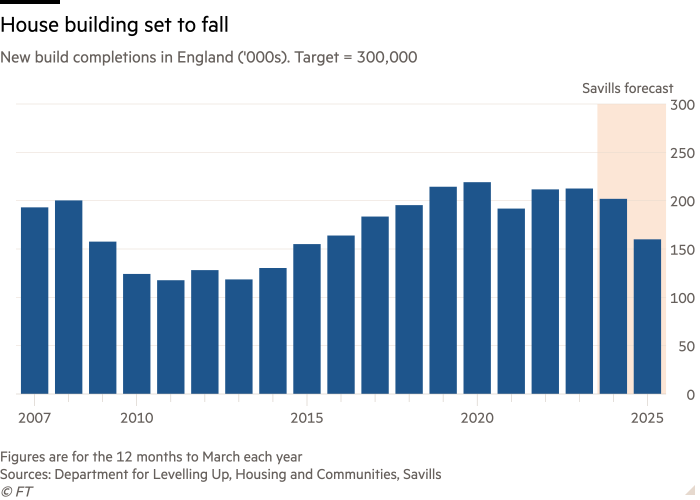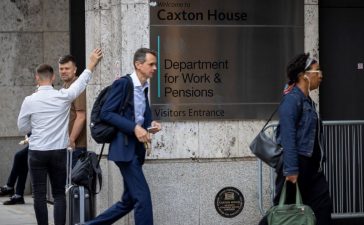Unlock the Editor’s Digest for free
Roula Khalaf, Editor of the FT, selects her favourite stories in this weekly newsletter.
The number of new homes being built in England could fall to roughly half the official target unless the government steps up financial and policy support for new housing, according to a forecast from Savills.
The property group warned that the number of new home completions would fall from an annual average of about 210,000 over the past five years to 160,000 over the coming year as higher debt costs hit construction and home sales.
Savills said building rates would probably stay low until at least 2030 without a boost from the government.
The projected decline in housebuilding poses a challenge to both main political parties ahead of a general election, expected this year, in which housing will be a big issue. Both the Conservative government and opposition Labour party have committed to building 300,000 homes a year.
Emily William, director of Savills residential research, blamed the fall in homebuilding on uncertainty in the planning system, steep inflation of building costs and a weaker sales market as buyers struggle with higher mortgage rates.
But she said the problem had been “compounded by the absence of increased policy support” from the government.

New-build completions hit 212,570 in the year to March 2023, the most recent year of official data. Savills projects this will fall to 201,900 in the year to March 2024, and then to 160,000 over the coming year.
New completions are the main component of the measure of “net additional dwellings”, which stood at 234,400 in the year to March 2023.
Housebuilding is in decline across England and the wider UK, with the number of new home starts in the final quarter of 2023 half the 10-year average, according to official figures. Large commercial housebuilders, which build the bulk of new homes, have cut their output by about a quarter as buyers are put off by high mortgage rates.
Big developers such as Taylor Wimpey and Persimmon have said they do not expect their output to begin to recover before 2025.
Meanwhile, housing associations, which build and run affordable housing, have warned that many of their development plans are no longer viable because they rely on private sector debt that is now too expensive.
Kate Henderson, chief executive of the National Housing Federation, which represents housing associations, said the government should provide increased funding to support 120,000 to 140,000 new affordable homes annually to plug the gap in housing supply.
She added that Savills’ figures “clearly show that boosting the supply of new affordable homes is not only key to solving the housing crisis, it’s also the only way to meet the government’s housing targets in the current climate and crucially can help the construction industry recover from the market downturn”.
The Home Builders Federation trade group has called on the government to provide help to buyers. “The lack of affordable mortgage availability is suppressing demand,” it said, adding that “political failure” to address planning and environmental regulation was making it difficult to build.
A spokesperson for the Department for Levelling Up, Housing and Communities said £11.5bn was already being invested in affordable homes.
“The fact is the highest annual rates of housing supply over the past 30 years have all been delivered since 2018, and our reforms and long-term plan for housing will drive up building rates even further,” they added.










